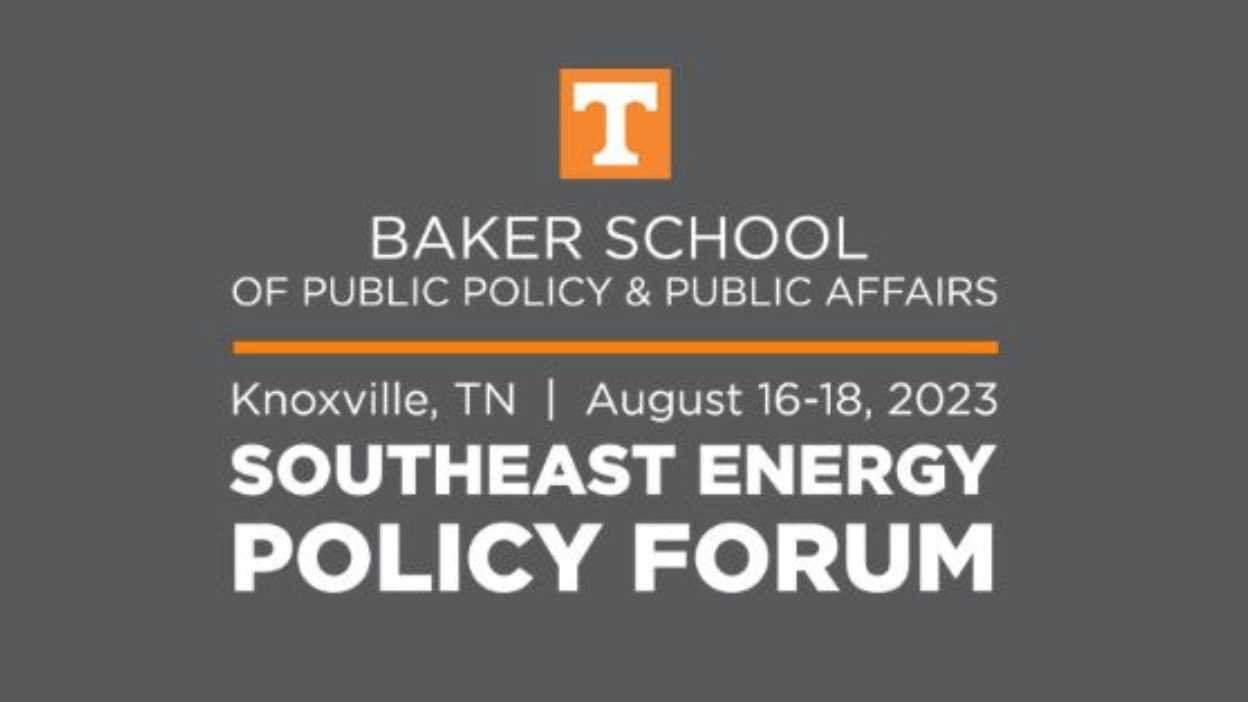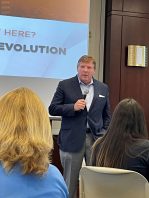
Mike Howard jumpstarts first day of the “Southeast Energy Policy Forum”
The CEO Emeritus of EPRI and Chair of World Energy Council talks about the East Tennessee region's history of leadership in energy and environmental matters.
In an address Wednesday that jumpstarted the first day of the “Southeast Energy Policy Forum” on the campus of the University of Tennessee, Knoxville (UTK), Mike Howard talked about the region and its leadership for decades in the energy and environmental policy world.

“There is a bigger cluster of energy thought leaders here than any other place I’ve ever been,” the Chief Executive Officer (CEO) Emeritus of the Electric Power Research Institute Inc. (EPRI) noted. That says a lot. As we explained in this March 1 teknovation.biz article, Howard now chairs the Board of Directors of the World Energy Council and has traveled the globe frequently in his previous leadership role at EPRI as well as now.
The event is being held in the new Baker School of Public Policy and Public Affairs which is named for former U.S. Senator Howard H. Baker Jr. who was known for his bipartisan style of making things happen. Howard paid tribute to the now-deceased Tennessee native, noting how he worked with the late U.S. Senator Edmund Muskie, a Democrat from Maine, to champion both the Clean Air and Clean Water Acts.
Then President Richard Nixon vetoed the Clean Water Act in October 1972, saying in his veto message that he hoped to attack pollution in “a way that does not ignore other very real threats to the quality of life, such as spiraling prices and increasingly onerous taxes.” The two Senators led an effort that resulted in Congress overturning the veto quickly and decisively in a 12-hour period.
“In the house of Howard Baker, you have to end on a story like that,” Howard told the attendees.
Now, roughly 50 years after the passage of the legislation, the world is faced with significant challenges from both an energy and environmental perspective as Howard presented a rapid-fire review of how energy usage has evolved in the U.S. and the rest of the world.
“Up until 250 years ago, most of what we used for energy was biomass,” he said. That has significantly changed with the industrial revolution, and today 80 percent of global energy comes from hydrocarbon sources.
Noting that there are 3,200 gigatons of CO2 in the atmosphere, he said that the problem is only going to get worse as global energy use is expected to increase by 40 percent, and 65 percent of that increase will be in electricity.
“We have an obligation to significantly reduce, if not eliminate, the damage that energy does to the environment,” Howard concluded, having earlier noted that “this area (region) is one of the most fertile grounds for research” on solutions that balance needs for increased energy with a sensitivity to the environment.
Ahead of Howard’s leadoff presentation, Charles Sims, Director of the Baker School’s Energy and Environmental Program, told attendees that the Baker School will soon implement an “Energy Policy Uncertainty Index” on its website.
Other speakers on the first day included: (1) Neeraj Bharadwaj, Proffitt’s Professor of Marketing among many other titles in the Haslam College of Business, who addressed “Sustainability: What It Means, Why It Matters and What’s Next”; (2) Nikki Luke, Associate Professor in UTK’s Department of Geography and Sustainability, who spoke about “Energy Equity: Considerations to Support Equitable Outcomes for Workers, Consumers, and Environmental Justice”; and (3) Chad Autry, Associate Dean for Research and Faculty in the Haslam College, who focused on the topic of “Thinking about Supply Chain 2030.”
There were also two panels. One, focused on “Building a Green Energy Workforce,” featured Chien-fei Chen, Director of UTK’s Energy and Environmental Justice program; Bob Corney, Co-Founder and Chief Operating Officer of Clear Loop; and Jeff Sisk, Executive Director of the Center for Workforce Development for the Tennessee Board of Regents. The other featured Joe Hoagland, Vice President of Enterprise Relations and Innovation at the Tennessee Valley Authority; Shameek Konar, former CEO of Pilot Company; and Clay Rikard, Vice President for System Planning at the Southern Company.
The conference continues through Friday.
Like what you've read?
Forward to a friend!

